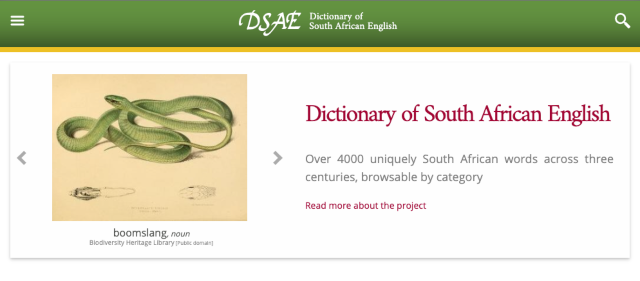
The recent release of a data-rich historical dictionary on smartphones and tablets (iOS & Android supported), marks a revolutionary step for the development of resources documenting South African English usage over three centuries.
The Dictionary of South African English (DSAE), which was first published in print in 1996, contains 4600 main entries with 45 000 bibliographically-referenced quotations covering 17 500 word forms and their histories, including first recorded use. The online version has now been published in an edition designed specifically for use on mobile devices, at no cost to the user. The range and extent of the dictionary includes terms that have developed locally, in everyday use, not only colloquially, as well as in specialist fields such Architecture, Law and Industry.
“The current release of the DSAE is, as far as we’re aware, the first historical dictionary that has a mobile-optimised online edition,” explained Executive Director of the Dictionary Unit for South African English, Tim van Niekerk. “Given that over two-thirds of our audience now accesses the dictionary from smartphones and tablets, this makes the dictionary accessible to a new, younger audience, both in South Africa and globally.”
Following extensive digital enhancements, dictionary users can now manipulate this unrivalled record of South African English as a structured database. Words can be grouped in dictionary ‘slices’, e.g. by date of entry into the language using an interactive visual slider, or filtered by language of origin, subject or usage category (with over 180 subcategories in all). Individual word histories – often spanning centuries – can also be navigated visually by meaning or quotation evidence, revealing developmental patterns previously submerged in the written text.
“Our intention is also to encourage and facilitate new research into South African English. The online dictionary is the synthesis of our Unit’s large lexical database collected over decades and, more recently, digitally. This provides the raw material for extensive further exploration and documentation of the regional varieties of English,” van Niekerk stated.
The dictionary was compiled on ‘historical principles’ which means that, like the online Oxford English Dictionary (http://oed.com), it presents word development chronologically, giving full word histories with real-world quotation evidence from referenced sources.
Lexicographers get excited about this, said van Niekerk, because they get to hunt down and record the ‘first known use’ of words or particular meanings. “The historical dictionary model is an empirical one that seeks to involve the dictionary user by showing words in their context, as they come into use and their meanings change through time,” he further explained.
Despite all of this remarkable value, the dictionary is completely free to access, which is unlike most other online specialist dictionaries. According to van Niekerk, “In line with our interest in making the dictionary widely available, we took the decision to adopt a free access publishing model. This became possible after we undertook to produce the electronic version ourselves, without reliance on commercial publishers or external IT contractors. We started by employing part-time developers who were completing degrees in Computer Science or Information Systems at Rhodes 老虎机游戏_pt老虎机-平台*官网. Having programmers in our offices improved the development process greatly. After that, we took the plunge, adapted our staff profile and became autonomous developers and publishers of the online dictionary.”
Key features of the online dictionary include:
- Fully responsive design, rescales to preserve advanced Desktop features on Android & iOS (most modern browsers supported)
- Graphical presentation & navigation of word histories and source quotation data (data aggregation devices reveal new insights and relations)
- Navigate complex entries structurally, not only by sequential reading of text
- Powerful filtering options presented in a simple way: no unwieldy ‘advanced search’ forms to complete; stack or unstack search filters easily without cognitive overload
- Refine search & filter results by date span with a visual slider; sort entries (or the entire unfiltered dictionary) by year of first recorded use.
To access the dictionary, go to http://dsae.co.za.
The online DSAE is a project of the Dictionary Unit for South African English, Rhodes 老虎机游戏_pt老虎机-平台*官网, Makhanda (Grahamstown), South Africa: /dsae/.
